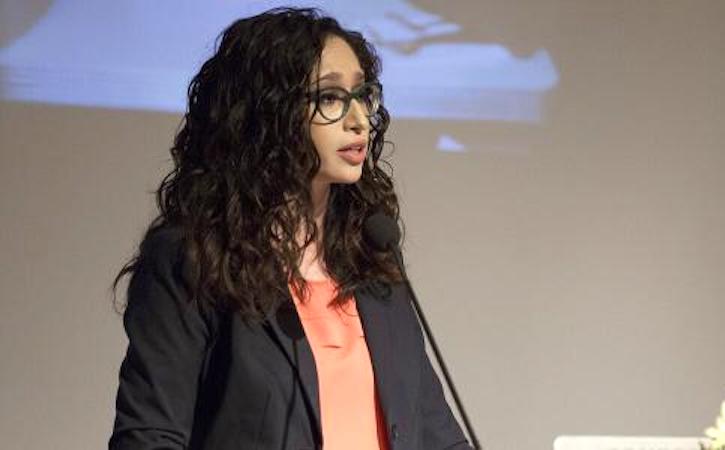Jewish Food Fights: Students Get Appetite for Culinary Traditions

Prof. Rachel Gross reflects on her U.S. Jewish food history class, the #JewishStudiesAnd series, and working in the Department of Jewish Studies.
The Department of Jewish Studies has sanctioned food fights all semester long. No actual food has been reported to have been flung, however, in Rachel Gross’ Jewish Food Fights course, which explores the politics of religion, food and eating among Jews in America since the 19th century.
In this Q&A, Gross — the John and Marcia Goldman Professor of American Jewish Studies — dishes on how students can learn about cultural traditions through cuisine.
What gave you the idea for the course?
You are what you eat, as the saying goes. Studying what people eat and how they talk about food is a great way to learn about their lives and how they think about themselves and others. I’m a religious studies professor who studies American Jews, and American Jews have thought carefully about how what they eat makes them different from and similar to other Americans since the colonial period.
Professors at other universities have offered classes on studying religion through food, but I was one of the first to offer a course that traced American Jewish history through food studies. We go from how colonial Jewish merchants connected Jews in the Americas and Europe through transporting and selling food all the way to Urban Adamah, the Jewish farm in Berkeley, and Covenant Winery, the kosher winery in Berkeley. We’re taking a field trip to both of those places in May!
How often do you teach it?
This is my third year at SF State, and so far I’ve offered it once a year, in the spring.
How have students responded to the course?
Like all of our Jewish Studies courses, it’s attracted a wide range of students from all backgrounds. The course is designed to help students analyze the world around them, whether or not they’re Jewish. For me, the most exciting moments in the class are the material we study, helping students think about their own lives, their families and their communities. The role that food plays in their lives and the way it defines them and their communities.
I also love studying primary sources with students — when we can laugh about the ridiculous things people included in early 20th-century cookbooks but also think carefully about what it tells us about the people who made those cookbooks and how they might have used them.
I also really like thinking about really ordinary things with students, and asking what they tell us about the people who make and use (or eat) them. Today we talked about what the history of bagels tells us about American Jews. It’s such an ordinary item that we might overlook it in our day-to-day lives, but thinking about the way it moved from a specifically Jewish food item in the early 20th century to one eaten every day by many Americans today helps us think about the place of Jews in the United States and the way they’ve influenced American culture more broadly.
Can you let us know some of the visiting scholars and more about food journalist Alix Wall’s work and how it benefited your students?
Alix Wall spoke as part of the department’s #JewishStudiesAnd series and in conjunction with my course. The series is designed to introduce students to a wide variety of professions in which they can use the skills they learn as a Jewish Studies or other humanities major.
In the American Jewish food course, Alix’s writing about Jewish food, especially but not only her writing in the J. newspaper is a primary source through which we can learn about Jews and food in the Bay Area. But having her speak helped students learn how she does her research and reporting. Students are required to write a paper as a newspaper article on a local site of Jewish food, and I explicitly point to Alix’s writing as a model for them.
Having her speak about her Jewish food writing also demonstrated that our course subject matters to people in our community, beyond the classroom. We aren’t studying this topic in isolation.
Any thoughts about how the Jewish Studies program can benefit a prospective student applying to SF State?
The Department of Jewish Studies is devoted to the study of the history, culture, religion, politics and literature of the Jewish people. We’re a small, warm department of faculty members who deeply care about our students, so they don’t get lost in the shuffle of a big school. Our majors, minors and other students in our courses are from all and no religious backgrounds.
To me, studying Jews is just a way of studying people in general, and our faculty members introduce students to history, politics, film studies, pop culture studies, comparative literature and religious studies. For me, the most interesting thing to do in life is to learn about what’s meaningful to people and why those things matter to them. My courses help students questions about what’s been meaningful to American Jews as a way of asking questions about how people make meaning — including how my students do so in their own lives.
— Ufuoma Umusu